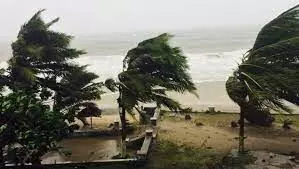
World Food Programme (WFP), on Friday warned against impact of cyclone, saying lives, livelihoods, and vital crops are at risk across Madagascar with Tropical Cyclone Batsirai expected to make landfall within hours.
The UN food agency said that the island nation off the coast of East Africa was still reeling from the impact of Storm Ana in January.
"Frequent cyclones during the agricultural season mean loss of harvest, high food prices and increased food insecurity," WFP Deputy Regional Director, Margaret Malu, said.
Two weeks after Storm Ana ploughed across Madagascar, Mozambique and Malawi, causing heavy flooding, destruction to homes and public infrastructure and displacing communities, WFP is preparing for the impending arrival of Cyclone Batsirai.
"WFP is on the ground, and we are ready to provide logistics support to governments and NGO partners, to aid relief efforts and drones and boats, in case of flooding," Malu said.
"We have also prepositioned food to be able to quickly provide emergency food assistance".
In response to Storm Ana, WFP is working closely with governments, providing logistics support to search and rescue efforts, conducting needs assessments and organising food distributions.
"The floods and bad weather have not only devastated homes and damaged property, but above all they have destroyed the livelihoods and sources of income of the affected households," Pasqualina Di Sirio, WFP Country Director in Madagascar, said.
Meanwhile, the UN agency continues its lean season food distributions and school meals programmes, where possible.
"Their short- and medium-term food security is in great peril," attested Di Sirio. "These families, currently in a situation of total destitution, will see their living conditions deteriorate in the absence of urgent assistance until their situation returns to normal."
Cyclone Batsirai has the potential to derail relief efforts underway in the aftermath of Storm Ana, that hit not only Madagascar but also Mozambique and Malawi.
And the impact of devastating Cyclone Idai in 2019 is still fresh in the minds of vulnerable communities who are struggling to build their lives back.
Extreme weather events like cyclones have become more frequent and intense in Southern Africa – driving hunger and eroding development, causing devastation sometimes in a matter of hours, according to WFP.
WFP's resilience programmes – including dam building and irrigation systems; drought resilient farming methods; and rehabilitating forests – support long-term food security and bolster communities to better cope with future shocks.
Meanwhile, in the aftermath of Storm Ana, the UN humanitarian office, OCHA, is supporting Government-led relief efforts to mobilise assistance for those displaced by flooding.
This includes cash, food, water, sanitation and hygiene items, as well as health, protection and camp management services at the displacement sites.




